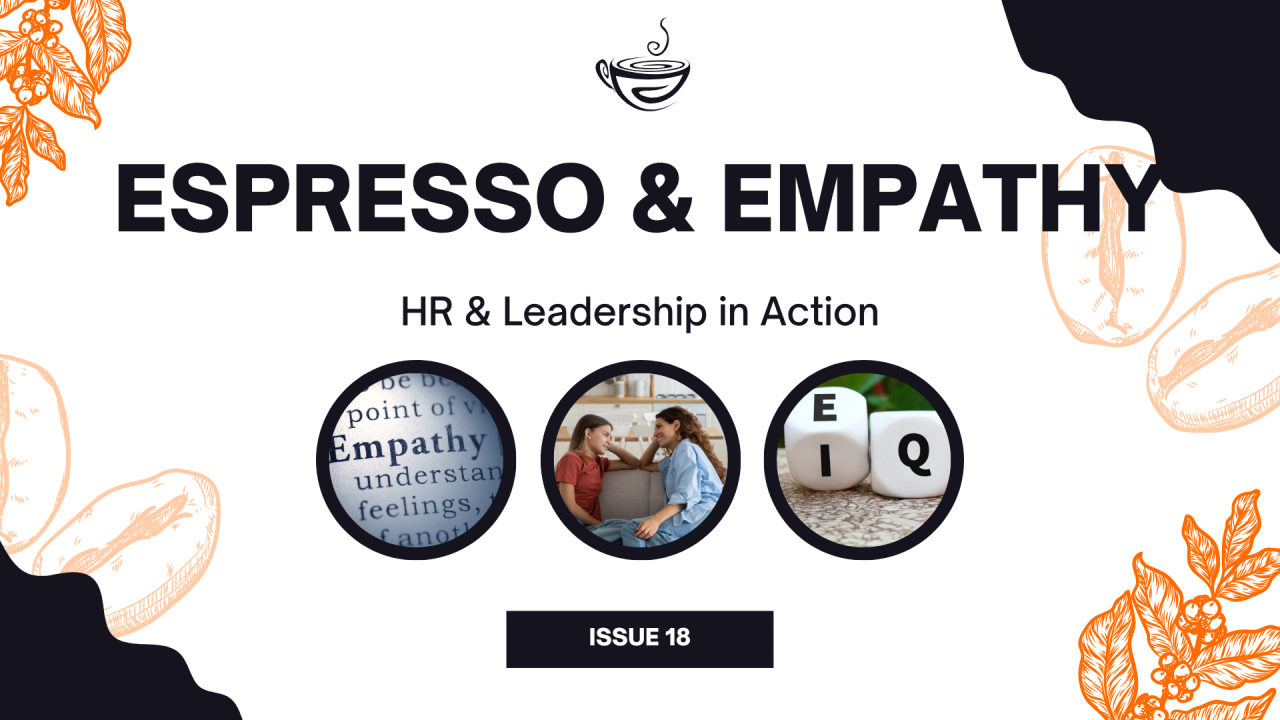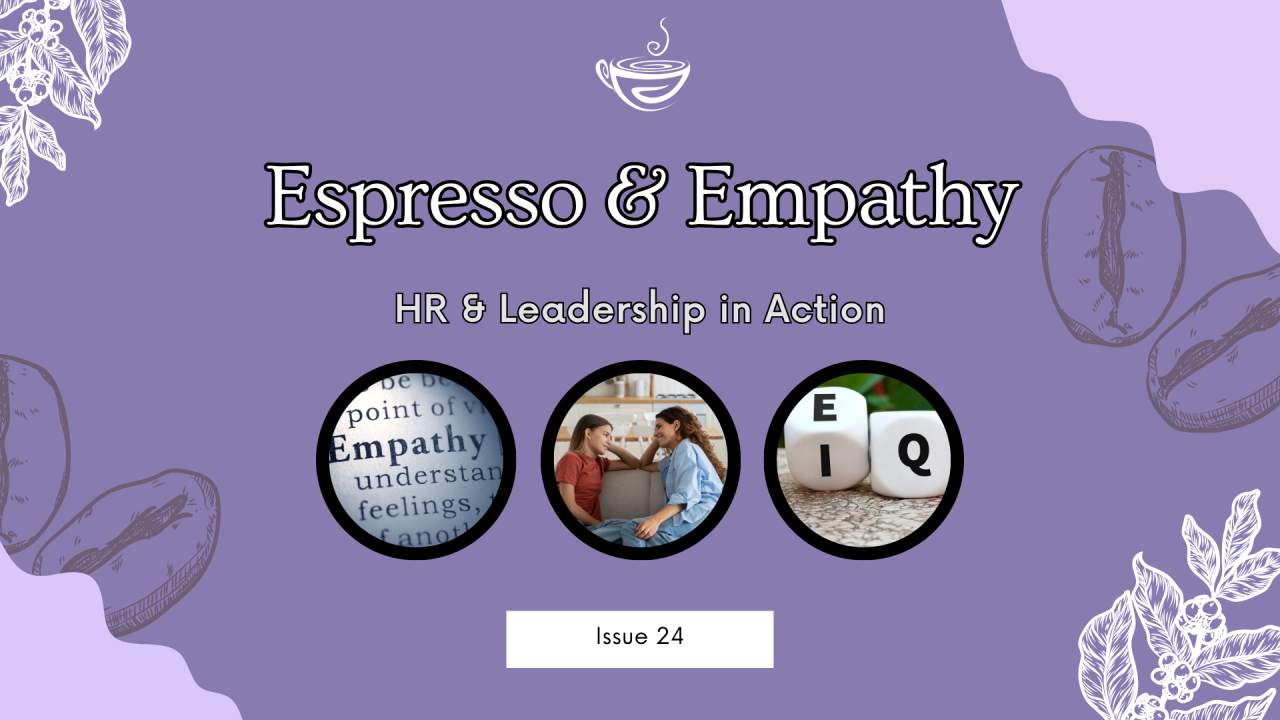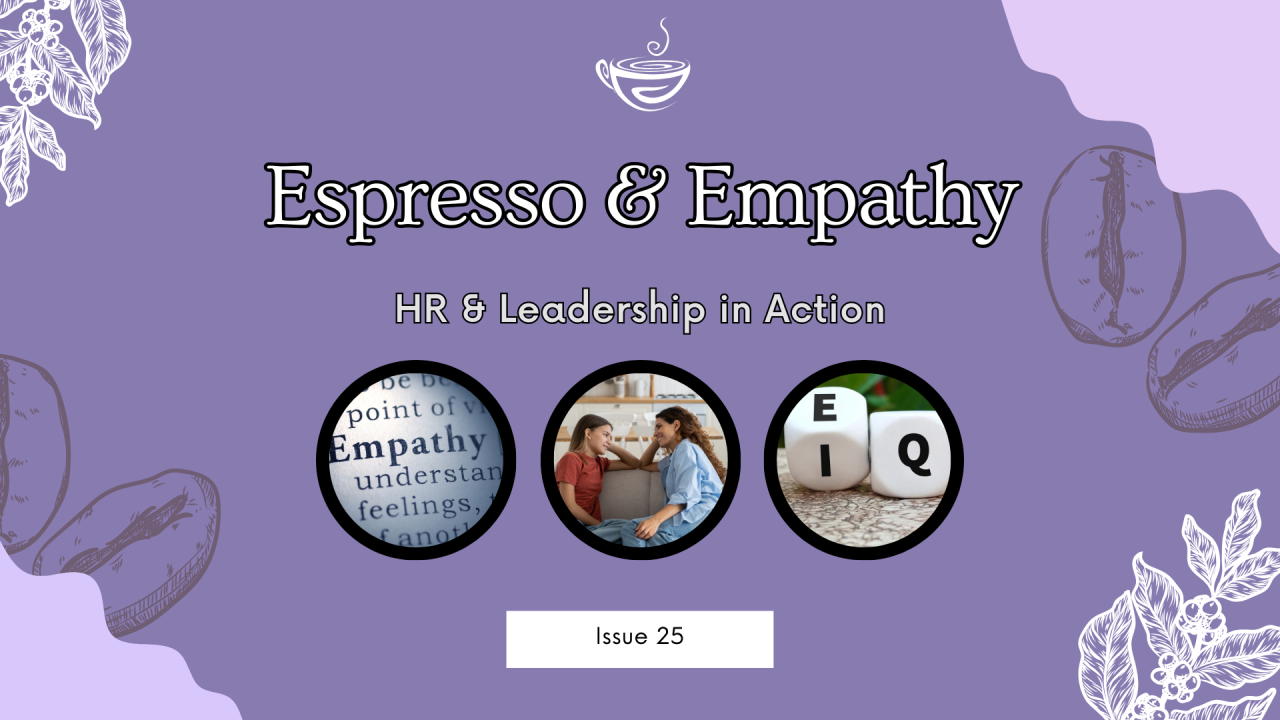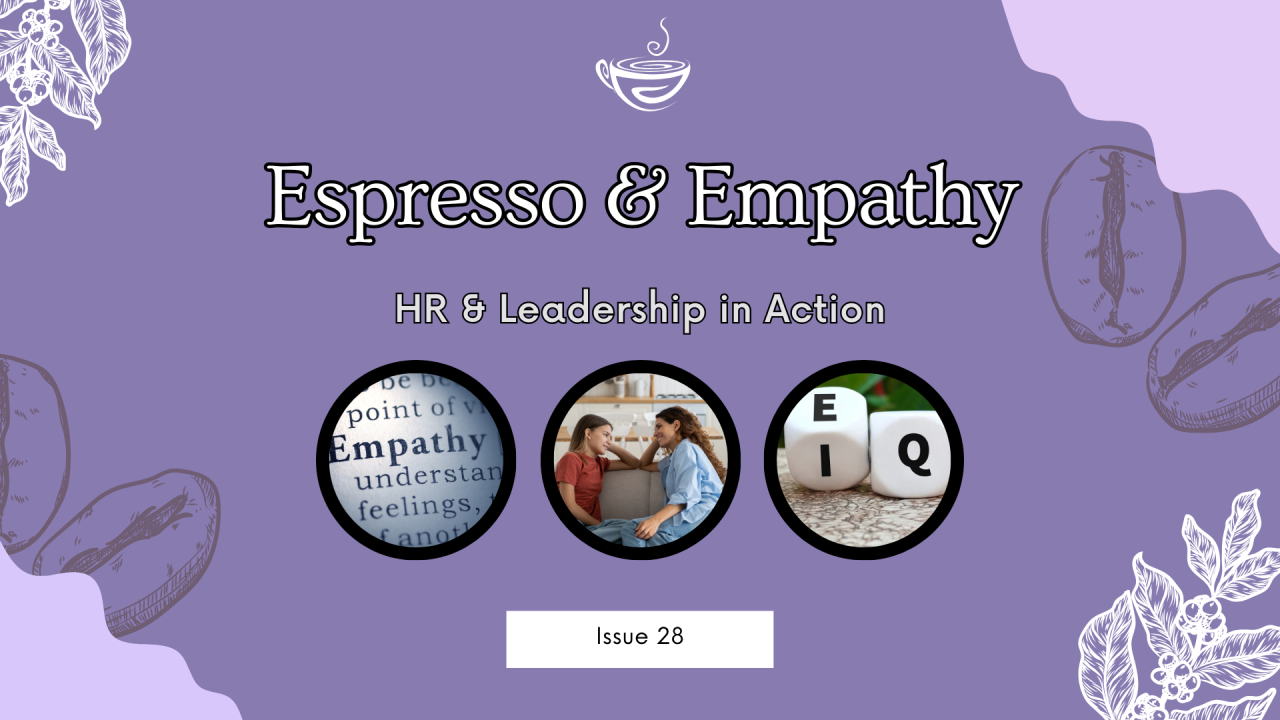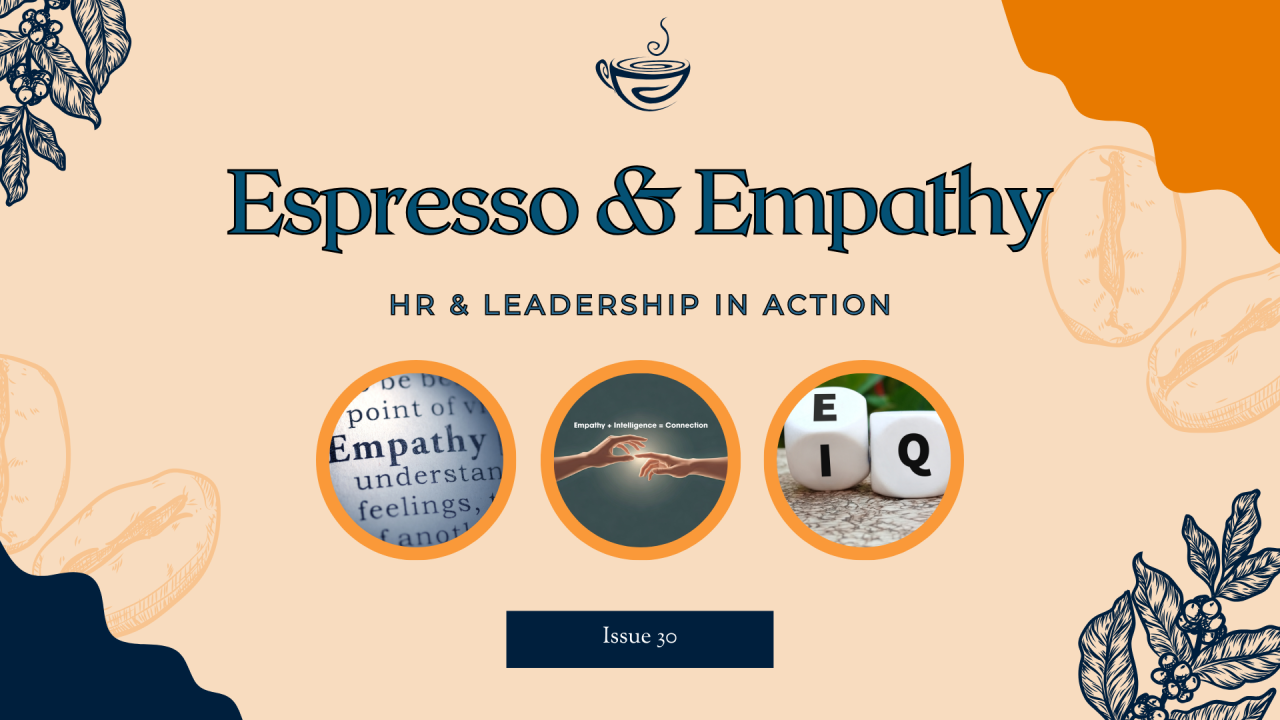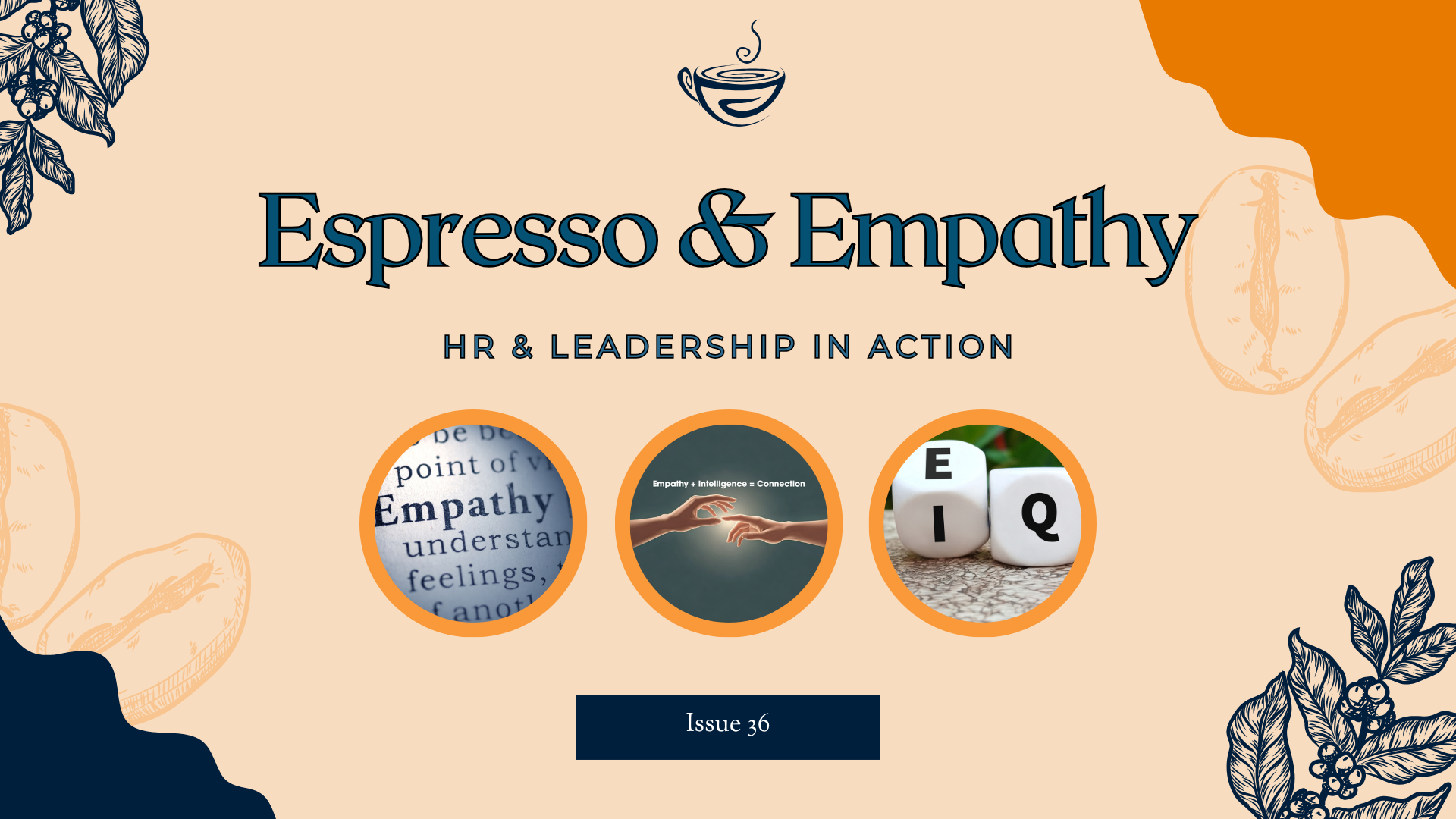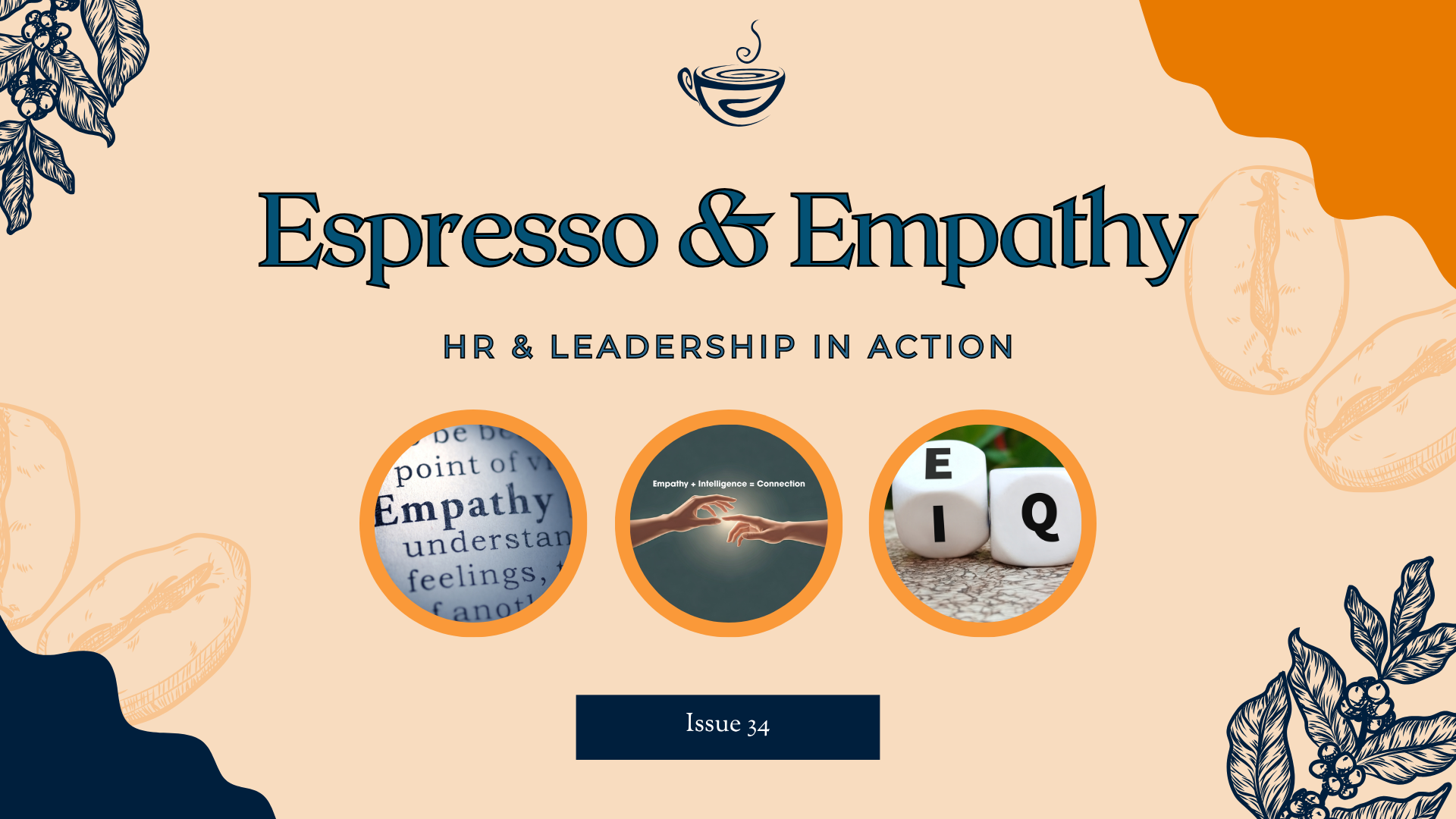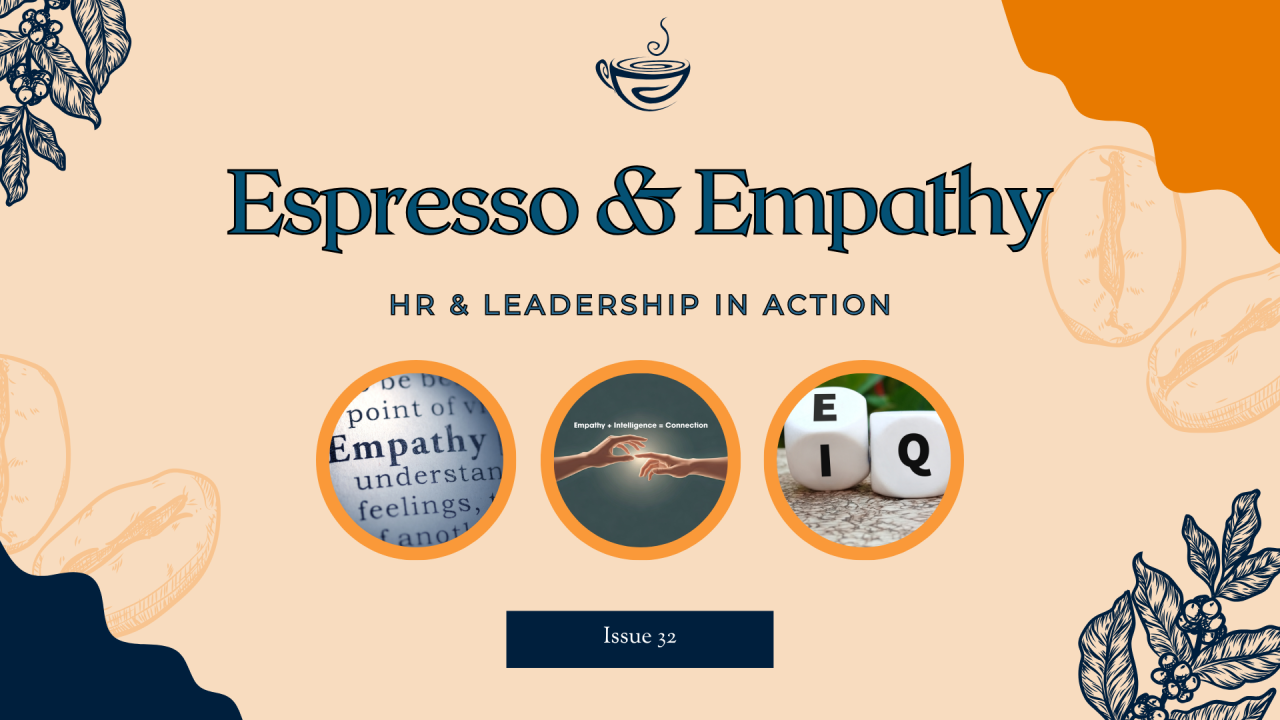Brewed for Leaders Who Care
Bold Ideas. Real Leadership. No Fluff.
Weekly insights on trust, empathy, and emotionally intelligent leadership — written for HR professionals, small business owners, and anyone who believes people matter.
Love what you’re reading? Get new issues delivered to your inbox every Wednesday.
Issue 01 - Welcome to the Conversation
Why People Really Leave — and What Leaders Can Do About It
Retention isn’t just about raises or perks. This issue dives into the deeper reasons employees walk away—like feeling undervalued or unheard—and offers three actionable leadership behaviors that build trust, boost engagement, and help your best people stay.
Issue 04 - Trust Is the Currency of Leadership and Culture
Trust is the Foundation of Everything
In this issue of Espresso & Empathy, we explore why trust is the true currency of leadership—and how it impacts every corner of your workplace. You’ll learn what builds trust, what breaks it, and how leaders can rebuild it with consistency, presence, and integrity. If your team feels disengaged or distant, it may not be about performance—it could be a trust issue.
Issue 07 - Burnout Isn’t a Performance Problem—It’s a Leadership Signal
Burnout Isn’t a Badge of Honor—It’s a Warning Sign
Burnout isn’t about weakness—it’s often a leadership and culture issue. In this issue of Espresso & Empathy, we unpack what burnout really looks like in today’s workplace and how leaders can unintentionally fuel it. Learn how to create sustainable performance through empathy, clarity, and support, using tools from Blanchard’s Self Leadership and Coaching Essentials frameworks.
Issues 01-10
Issue 02 - HR: A Strategic Partner, Not Just a Support Function
HR at the Table: Making the Case for Strategic Partnership
HR is more than compliance—it’s a driver of business performance. This issue makes the case for giving HR a seat at the executive table, highlighting how strategic HR leadership can improve retention, elevate talent, and shape culture from the top down..
Issue 05 - Psychological Safety — The Secret Ingredient of High-Performing Teams
Psychological Safety: The Secret Ingredient of High-Performing Teams
Silence in meetings doesn’t always mean agreement—sometimes, it signals fear. In this issue of Espresso & Empathy, we unpack the leadership behavior that fuels innovation, trust, and team connection. You’ll learn what psychological safety really means, why it’s a business imperative, and how to create a culture where people feel safe to speak up, take risks, and be fully themselves at work.
Issue 08 - What Does a Good Job Look Like?
What Does ‘A Good Job’ Look Like? Define It—Then Watch Performance Rise
Vague expectations lead to missed targets, frustration, and disengagement. In this issue of Espresso & Empathy, we explore how clearly defining what “a good job” looks like can boost performance, reduce confusion, and strengthen trust. You’ll get practical insights on how to communicate expectations in a way that builds clarity, confidence, and accountability—along with a leadership self-check to help you assess your own clarity habits.
Issue 10 - When Was the Last Time You Caught Someone Doing Something Right?
Recognizing What’s Going Right
If the only time your team hears from you is when something goes wrong, you’re missing the most powerful leadership opportunity of all. This issue explores how specific, timely recognition builds trust, drives engagement, and reinforces the behaviors that lead to long-term success.
Issue 03 - Leadership Isn’t Just About Decisions—It’s About People
The Emotionally Intelligent Leader: Why EQ Outranks IQ
This issue explores the power of Emotional Intelligence in leadership. Learn the four essential components of EQ, why empathy and connection drive performance, and how tuning into your team’s emotions can transform how you lead, build trust, and communicate.
Issue 06 - Leading Through Change – Why Most Change Fails and How to Get It Right
Leading Through Change—Why Most Change Fails and How to Get It Right
Most change efforts don’t fail because of poor strategy—they fail because people feel left behind. In this issue of Espresso & Empathy, we explore how emotionally intelligent leaders navigate change with clarity and connection. Learn the difference between change management and change leadership, discover key insights from Blanchard’s proven framework, and use our self-audit to assess your effectiveness in leading your team through transitions.
Issue 09 - Leading with Empathy – The Most Misunderstood Leadership Skill
Empathy Is a Leadership Skill—Not a Personality Trait
This issue of Espresso & Empathy clears up the common confusion between empathy and sympathy—and why only one builds trust. We break down how empathetic leadership drives performance, strengthens retention, and creates accountability without sacrificing standards. You’ll get real-world strategies for leading with empathy and insight into how Martin & Foster trains leaders to build meaningful connection while still driving results.
Managing Up – Why It’s a Leadership Skill at Every Level
Leadership isn’t just about managing down—it’s about managing up. This issue explores how emotionally intelligent professionals can build trust, communicate clearly, and proactively support their leaders, regardless of title or role.
Empathy in Action—Listening When Emotions Run High
When an employee or customer is upset, empathy isn’t optional—it’s essential. This issue offers practical ways to respond with care, de-escalate tension, and maintain healthy boundaries without over-apologizing or over-owning.
Empathy vs. Sympathy—And Why the Difference Matters
This issue breaks down the often-confused concepts of empathy and sympathy in leadership. Learn why empathy builds trust and connection, while sympathy can unintentionally create distance—and how to respond with emotional intelligence when it matters most.
Issues 11-19
Listening Is an Act of Leadership – Empathetic Listening in Action
Leadership isn’t just about talking—it’s about listening to understand. This issue dives into how empathetic listening builds trust, strengthens culture, and transforms everyday conversations into moments of meaningful connection.
Empathy with Boundaries—When (and Why) Empathy Isn’t Always the Answer
Empathy becomes a liability when it replaces accountability. This issue explores how to lead with heart without compromising performance, using emotionally intelligent strategies that support people while holding high standards.
What Happens When “Inclusion” Gets Rebranded?
In this edition, we examine SHRM’s decision to rename its Inclusion Conference—and what that change may signal about the state of DEI in today’s workplace. When inclusion gets reframed or removed, leaders must ask: what message are we sending, and to whom? At a time when empathy, trust, and belonging are already under pressure, clarity and conviction matter more than ever.
Quiet Constraint—The Engagement Crisis No One’s Talking About
When employees stay silent, it’s not always apathy—it’s self-protection. This issue explores how trust, empathy, and psychological safety empower people to speak up and fully contribute..
Empathy in a Divided World—Leading with Humanity in Uncertain Times
When tensions rise, strong leaders lean into empathy—not away from it. This issue explores how to foster respectful dialogue, create psychologically safe spaces, and lead with human dignity, even when values differ.
The Performance Review Reset – Rethinking Feedback Culture
This issue challenges the outdated model of annual reviews and explores how emotionally intelligent leaders are embracing real-time, trust-based feedback. Learn why feedback is more than a form—it’s a relationship. Discover practical ways to create a culture where coaching, growth, and honesty are part of everyday leadership..
When Positivity Becomes Pressure
When positivity becomes a requirement, it can silence real issues. This issue explores how toxic positivity damages trust and connection—and what emotionally intelligent leaders can do instead.
The Push for “Back to the Office”—How (Not) to Break Trust in the Process
Return-to-office mandates are more than policy—they’re trust tests. This issue explores how to lead RTO decisions with empathy, consistency, and credibility to preserve morale and minimize backlash.
Ageism at Work—The Bias We Don’t Talk About Enough
This issue tackles ageism in the workplace—why it persists, how it harms, and what leaders can do to recognize age as an asset, not a liability. Because experience and wisdom are worth honoring.
Issues 20-29
The Art of Transparency—When Sharing the Truth Builds More Trust Than Protecting Feelings
When leaders withhold the truth to spare feelings, trust often suffers. This issue explores how to communicate hard truths with clarity and compassion—plus special guidance for HR professionals balancing transparency with confidentiality.
More Than Colleagues — The Leadership Value of Real Connection at Work
Workplace relationships aren’t just a bonus—they’re foundational to trust, resilience, and performance. This issue explores how connection fuels leadership, with practical strategies for building authentic relationships at work.
The Hidden Cost of Micromanagement – How It Destroys Confidence and Trust
This issue unpacks how micromanagement damages trust, stifles growth, and leads to disengaged teams—and what emotionally intelligent leaders can do instead to empower, coach, and trust.
Difficult Conversations with Empathy—What to Do When Emotions Rise
Tough conversations don’t have to derail trust. This issue offers emotionally intelligent strategies to lead with empathy—even when tensions run high—while maintaining clarity, care, and forward progress.
Team Building in a Hybrid World—Keeping Connection Alive
Remote or in-office, strong teams don’t just form by proximity. This issue explores how leaders can build belonging, trust, and collaboration across hybrid environments—with five actionable strategies and a self-check to strengthen team connection.
The Hidden Cost of HR Mistakes
HR missteps aren’t just compliance risks—they’re culture risks. This issue explores how even “small” HR errors can erode trust, impact morale, and send the wrong message to your team. Includes a leadership self-audit to assess your organization’s HR health.t.
When Fear of Change Keeps People Stuck in Miserable Jobs
Employees don’t always leave when they’re unhappy—but that doesn’t mean they’re engaged. This issue unpacks why people stay in draining jobs and what leaders can do to support growth, prevent silent disengagement, and build a culture of trust and transparency.
Leading with Empathy Through Seasonal Stress
Recognizing Seasonal Stress Before It Derails Performance
As fall and winter bring heavier workloads and hidden emotional stressors, this issue explores how leaders can support teams with empathy—without sacrificing accountability.
When HR Isn’t a Safe Place—Rebuilding Trust in the System That’s Meant to Protect You
When HR Breaks Trust
This issue explores what happens when employees no longer feel safe turning to HR—and why Martin and Foster is stepping in to rebuild that trust with a confidential, independent solution.
Discipline with Heart
The Balance Between Empathy and Discipline
Empathy and discipline are often viewed as opposites—one soft, one firm—but true leadership requires both. In this issue, Anita Martin explores how empathy and accountability work together to build trust, protect fairness, and maintain performance standards. Leaders learn how to balance compassion with clarity, hold people accountable with respect, and recognize when discipline is the kindest act of care.
Issues 30-Current
The Conversation You’re Avoiding Is Costing You
Avoiding Tough Talks? It’s Costing You.
This issue breaks down why dodging difficult conversations erodes trust—and how emotionally intelligent leaders face them with clarity, empathy, and courage.
One-on-Ones That Matter – Why Consistent Conversations Build Trust and Performance
Making One-on-Ones Count
This issue explores how intentional one-on-ones can deepen trust, strengthen culture, and transform leadership from reactive to relational.
What Empathy Is—and What It Isn’t
What Empathy Is—and What It Isn’t
Empathy is often praised in leadership—but just as often misunderstood. In this issue, Anita Martin, Principal Consultant at Martin and Foster Consulting, defines what true empathy looks like in action—and what it doesn’t. She explores how authentic empathy builds trust, strengthens relationships, and leads with both compassion and accountability. Because empathy isn’t weakness—it’s wisdom in motion.
Empathy—It’s Not Just for Work
Empathy Isn’t Just for Work
Empathy is more than a workplace skill—it’s a life skill. In this issue, we explore how practicing empathy in everyday interactions strengthens leadership, deepens relationships, and builds trust across every part of life. From the boardroom to the living room, empathy has the power to transform connection, communication, and culture.

















